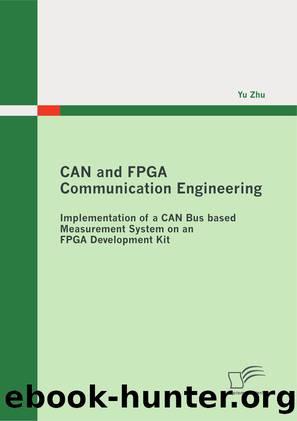CAN and FPGA Communication Engineering: Implementation of a CAN Bus based Measurement System on an FPGA Development Kit by Yu Zhu

Author:Yu Zhu [Zhu, Yu]
Language: eng
Format: epub
Tags: CAN, FPGA, UART, Microcontroller, Labview, Communication Engineering, Implementation
ISBN: 978-3-8428-1604-6
Publisher: Diplomica Verlag GmbH 2011
Published: 2012-02-09T00:00:00+00:00
Fig. 4.2 Underside (left) and top view (right) of the TDRB-HTG board [8]
In the experiments of this book three pins of J2 were used to make the serial communication for the FPGA. Table 4.1 lists the three pins with their functions.
Table 4.1 Pins applied for the FPGA
4.2 CAN MCU AT89C51CC03
As the FPGA does not offer any interface to the CAN bus and the CAN protocol is protected by patents, without a license from Bosch it is not allowed to program the FPGA directly with CAN. Therefore it is recommended to utilize an open-source protocol to read the output data from the FPGA first and then input them to the CAN bus. In this book an Atmel CAN MCU AT89C51CC03 with its mother board AT89STK-06 was applied as the third party to connect the communication for the FPGA and CAN bus. The AT89C51CC03 contains basic 8051 components, an additional CAN controller and so on (see below).
256 bytes of on-chip RAM
2048 bytes of on-chip ERAM
64K bytes of on-chip flash memory including 2K bytes flash for the Bootloader and 2K bytes EEPROM
Integrated Power Monitor to supervise internal power supply
14-sources 4-level interrupts
Three 16-bit Timers/Counters (T0, T1, T2)
32 I/O lines P0, P1, P2, P3, and 2 bits of P4
Five channels of 16-bit PCA with 8-bit PWM
Double Data Pointer
21-bit WatchDog Timer (7 programmable bits)
A 10-bit resolution analog to digital converter with 8 multiplexed inputs
X2 CORE (6 Clocks/machine cycle)
SPI interface
Full duplex UART
Full CAN controller
Download
This site does not store any files on its server. We only index and link to content provided by other sites. Please contact the content providers to delete copyright contents if any and email us, we'll remove relevant links or contents immediately.
The Mikado Method by Ola Ellnestam Daniel Brolund(22432)
Hello! Python by Anthony Briggs(21622)
Secrets of the JavaScript Ninja by John Resig Bear Bibeault(20183)
Dependency Injection in .NET by Mark Seemann(19563)
The Well-Grounded Java Developer by Benjamin J. Evans Martijn Verburg(19311)
Kotlin in Action by Dmitry Jemerov(19233)
OCA Java SE 8 Programmer I Certification Guide by Mala Gupta(18774)
Algorithms of the Intelligent Web by Haralambos Marmanis;Dmitry Babenko(17576)
Adobe Camera Raw For Digital Photographers Only by Rob Sheppard(16965)
Grails in Action by Glen Smith Peter Ledbrook(16726)
Sass and Compass in Action by Wynn Netherland Nathan Weizenbaum Chris Eppstein Brandon Mathis(14219)
Secrets of the JavaScript Ninja by John Resig & Bear Bibeault(12199)
Test-Driven iOS Development with Swift 4 by Dominik Hauser(10923)
A Developer's Guide to Building Resilient Cloud Applications with Azure by Hamida Rebai Trabelsi(10597)
Jquery UI in Action : Master the concepts Of Jquery UI: A Step By Step Approach by ANMOL GOYAL(10029)
Hit Refresh by Satya Nadella(9115)
The Kubernetes Operator Framework Book by Michael Dame(8537)
Exploring Deepfakes by Bryan Lyon and Matt Tora(8362)
Robo-Advisor with Python by Aki Ranin(8305)
